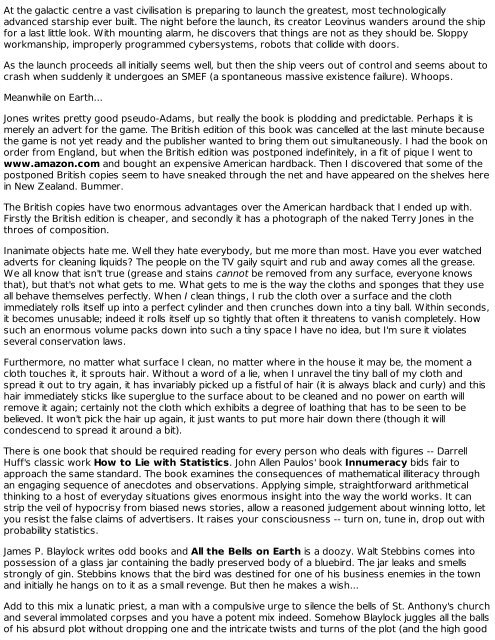Triffids Beard 2 - The Bearded Triffid
Triffids Beard 2 - The Bearded Triffid
Triffids Beard 2 - The Bearded Triffid
You also want an ePaper? Increase the reach of your titles
YUMPU automatically turns print PDFs into web optimized ePapers that Google loves.
At the galactic centre a vast civilisation is preparing to launch the greatest, most technologically<br />
advanced starship ever built. <strong>The</strong> night before the launch, its creator Leovinus wanders around the ship<br />
for a last little look. With mounting alarm, he discovers that things are not as they should be. Sloppy<br />
workmanship, improperly programmed cybersystems, robots that collide with doors.<br />
As the launch proceeds all initially seems well, but then the ship veers out of control and seems about to<br />
crash when suddenly it undergoes an SMEF (a spontaneous massive existence failure). Whoops.<br />
Meanwhile on Earth...<br />
Jones writes pretty good pseudo-Adams, but really the book is plodding and predictable. Perhaps it is<br />
merely an advert for the game. <strong>The</strong> British edition of this book was cancelled at the last minute because<br />
the game is not yet ready and the publisher wanted to bring them out simultaneously. I had the book on<br />
order from England, but when the British edition was postponed indefinitely, in a fit of pique I went to<br />
www.amazon.com and bought an expensive American hardback. <strong>The</strong>n I discovered that some of the<br />
postponed British copies seem to have sneaked through the net and have appeared on the shelves here<br />
in New Zealand. Bummer.<br />
<strong>The</strong> British copies have two enormous advantages over the American hardback that I ended up with.<br />
Firstly the British edition is cheaper, and secondly it has a photograph of the naked Terry Jones in the<br />
throes of composition.<br />
Inanimate objects hate me. Well they hate everybody, but me more than most. Have you ever watched<br />
adverts for cleaning liquids? <strong>The</strong> people on the TV gaily squirt and rub and away comes all the grease.<br />
We all know that isn't true (grease and stains cannot be removed from any surface, everyone knows<br />
that), but that's not what gets to me. What gets to me is the way the cloths and sponges that they use<br />
all behave themselves perfectly. When I clean things, I rub the cloth over a surface and the cloth<br />
immediately rolls itself up into a perfect cylinder and then crunches down into a tiny ball. Within seconds,<br />
it becomes unusable; indeed it rolls itself up so tightly that often it threatens to vanish completely. How<br />
such an enormous volume packs down into such a tiny space I have no idea, but I'm sure it violates<br />
several conservation laws.<br />
Furthermore, no matter what surface I clean, no matter where in the house it may be, the moment a<br />
cloth touches it, it sprouts hair. Without a word of a lie, when I unravel the tiny ball of my cloth and<br />
spread it out to try again, it has invariably picked up a fistful of hair (it is always black and curly) and this<br />
hair immediately sticks like superglue to the surface about to be cleaned and no power on earth will<br />
remove it again; certainly not the cloth which exhibits a degree of loathing that has to be seen to be<br />
believed. It won't pick the hair up again, it just wants to put more hair down there (though it will<br />
condescend to spread it around a bit).<br />
<strong>The</strong>re is one book that should be required reading for every person who deals with figures -- Darrell<br />
Huff's classic work How to Lie with Statistics. John Allen Paulos' book Innumeracy bids fair to<br />
approach the same standard. <strong>The</strong> book examines the consequences of mathematical illiteracy through<br />
an engaging sequence of anecdotes and observations. Applying simple, straightforward arithmetical<br />
thinking to a host of everyday situations gives enormous insight into the way the world works. It can<br />
strip the veil of hypocrisy from biased news stories, allow a reasoned judgement about winning lotto, let<br />
you resist the false claims of advertisers. It raises your consciousness -- turn on, tune in, drop out with<br />
probability statistics.<br />
James P. Blaylock writes odd books and All the Bells on Earth is a doozy. Walt Stebbins comes into<br />
possession of a glass jar containing the badly preserved body of a bluebird. <strong>The</strong> jar leaks and smells<br />
strongly of gin. Stebbins knows that the bird was destined for one of his business enemies in the town<br />
and initially he hangs on to it as a small revenge. But then he makes a wish...<br />
Add to this mix a lunatic priest, a man with a compulsive urge to silence the bells of St. Anthony's church<br />
and several immolated corpses and you have a potent mix indeed. Somehow Blaylock juggles all the balls<br />
of his absurd plot without dropping one and the intricate twists and turns of the plot (and the high good


